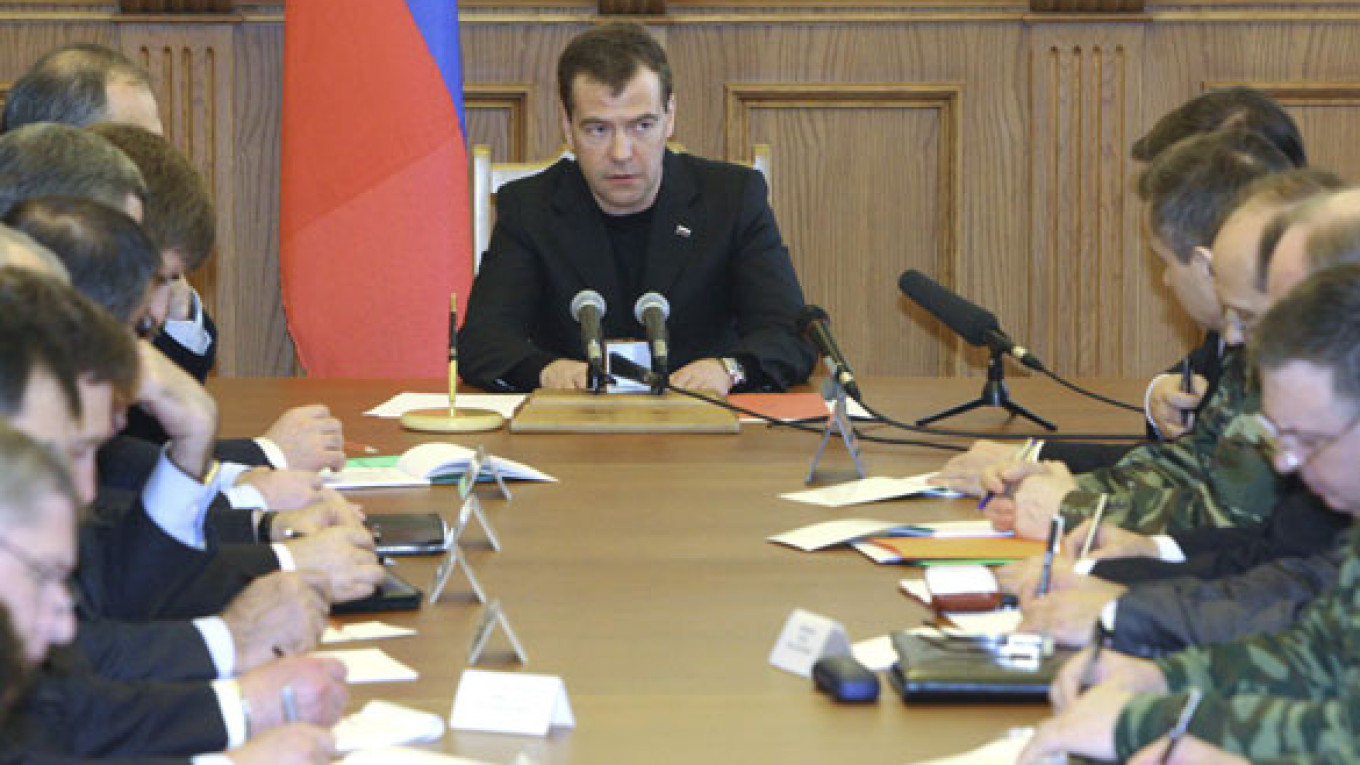President Dmitry Medvedev made a surprise visit Thursday to the violence-wracked southern province of Dagestan, telling police and security forces to use tougher, "more cruel" measures to fight the "scum" responsible for terrorist attacks.
Russia's security chief said some terror suspects had been detained.
In his dress — a black T-shirt under a black suit coat — and rough language, Medvedev was following the style of Russia's powerful prime minister, Vladimir Putin.
Twin suicide bombings this week in Moscow — which Islamic militants from the North Caucasus claim to have carried out — have refocused attention on the violence that for years has been confined to the predominantly Muslim republics in Russia's southern corner.
Another explosion Thursday killed two suspected militants and wounded a third in Dagestan near the border with Chechnya. Police said the men may have been transporting a makeshift bomb.
The day before, two suicide bombings in Dagestan killed 12 people, including nine policemen, a frequent target of attacks in part because they represent Russian authority.
The suicide bombings on the Moscow subway killed 39 people on Monday and have left nearly 90 hospitalized.
Medvedev said much more needed to be done to stop the attacks.
"The measures to fight terrorism should be expanded, they should be more effective, more harsh, more cruel, if you please," he told local officials in a televised meeting.
Funerals were held Thursday at four Moscow cemeteries for some of the subway victims. At the Khovanskoye cemetery, the family, friends and colleagues of Anna Permyakova, a 34-year-old nurse, could not hold back tears as they placed flowers on her open casket. Permyakova had worked in a rehabilitation center and many of her former patients attended the funeral in wheelchairs.
Federal Security Service director Alexander Bortnikov, who joined Medvedev in Dagestan, said the organizers of the Moscow attacks have been identified as "bandits" from the Northern Caucasus and some had been detained. He did not give specific numbers.
"We know the personalities of organizers," Bortnikov said during the meeting. "We have detained a number of people, conducted interrogations, got evidence."
In recent months, police and security forces have killed at least two high-profile Islamic militants, but they have been unable to capture the veteran Chechen militant Doku Umarov, who has claimed responsibility for the Moscow subway attacks.
"We have torn off the heads of the most notorious bandits, but clearly this was not enough. In any case, we will find them all and punish them," Medvedev said.
Umarov, who leads Islamic militants in Chechnya and throughout the North Caucasus, said the Moscow subway bombings were revenge for the killing of civilians by Russian security forces.
"Any politician, any journalist who accuses me of terrorism only makes me laugh, causes me to grin. I have not heard anyone accuse Putin of terrorism for the murder of civilians who were killed on his orders," Umarov said in a video posted Wednesday on Kavkazcenter.com, a web site used by rebels.
Umarov seemed to be taunting Putin, who had just vowed to "drag out of the sewer" the terrorists who plotted the subway attacks.
Umarov, 45, fought Russian forces in both separatist wars in Chechnya of the past 15 years. Shortly after taking over the leadership of the rebel movement in 2006, he announced a change of tactics. Instead of struggling for Chechen independence, the militants would seek to create an Islamic state across the North Caucasus. Umarov declared himself the emir, or military leader, of a Caucasus Emirate.
It is unclear, however, how much power he wields over the militants operating throughout the region.
The terrorist attacks in the North Caucasus are believed to be motivated not only by radical Islam but in some cases by a desire for personal revenge against police and security forces, who have been accused of killings, kidnappings and torture. The heavy-handed tactics have served to swell the ranks of Islamic militants.
A Message from The Moscow Times:
Dear readers,
We are facing unprecedented challenges. Russia's Prosecutor General's Office has designated The Moscow Times as an "undesirable" organization, criminalizing our work and putting our staff at risk of prosecution. This follows our earlier unjust labeling as a "foreign agent."
These actions are direct attempts to silence independent journalism in Russia. The authorities claim our work "discredits the decisions of the Russian leadership." We see things differently: we strive to provide accurate, unbiased reporting on Russia.
We, the journalists of The Moscow Times, refuse to be silenced. But to continue our work, we need your help.
Your support, no matter how small, makes a world of difference. If you can, please support us monthly starting from just $2. It's quick to set up, and every contribution makes a significant impact.
By supporting The Moscow Times, you're defending open, independent journalism in the face of repression. Thank you for standing with us.
Remind me later.


